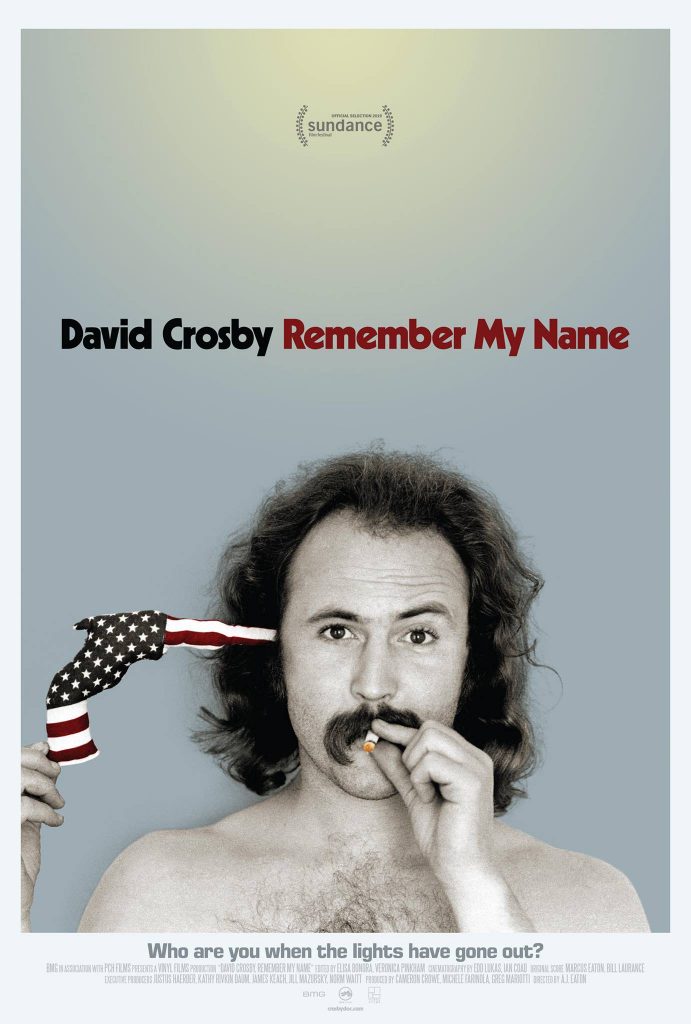 Sometime in the next couple of years, if David Crosby’s own prediction is correct, the game will be over for the two-time Rock and Roll Hall of Fame inductee. “I’ve had three heart attacks and have eight stents in my heart, as many as you can have,” he says in David Crosby: Remember My Name, the superb documentary—produced by Cameron Crowe (Fast Times at Ridgemont High, Almost Famous), Michele Farinola and Greg Mariotti, and directed by A.J. Eaton (in his directorial debut)—that played in theaters in 2019 and is now available on DVD and Blu-ray. He’s also had a liver transplant, suffers from diabetes and has faced numerous other health challenges over the years, much of it caused, in his own admission, by years of extreme substance and alcohol abuse.
Sometime in the next couple of years, if David Crosby’s own prediction is correct, the game will be over for the two-time Rock and Roll Hall of Fame inductee. “I’ve had three heart attacks and have eight stents in my heart, as many as you can have,” he says in David Crosby: Remember My Name, the superb documentary—produced by Cameron Crowe (Fast Times at Ridgemont High, Almost Famous), Michele Farinola and Greg Mariotti, and directed by A.J. Eaton (in his directorial debut)—that played in theaters in 2019 and is now available on DVD and Blu-ray. He’s also had a liver transplant, suffers from diabetes and has faced numerous other health challenges over the years, much of it caused, in his own admission, by years of extreme substance and alcohol abuse.
“I don’t know,” he says in the film when asked why, unlike so many of his peers from the ’60s/’70s rock world, he didn’t succumb. His continued existence is as much a mystery to him as to anyone. But now that he’s made it this far, to age 77, Crosby says, “I’m afraid of dying. I’d like to have a lot more time.”
[On the day Croz died, on Jan. 19, 2023, the film was made available to view for free on YouTube.]
After watching Remember My Name, and hearing his pristine vocalizing, as powerful as it’s ever been, we can only hope that Crosby’s timetable is wrong: Sober now for more than 15 years, he is certainly in better shape physically—and creatively—than he was in the early ’80s when, seriously addicted to heroin and cocaine, the law caught up to him and he found himself doing time in a Texas prison.
Watch David Crosby and Chris Thile play “Guinnevere” in 2018
His frankness, that honesty about his own past and present, drives the documentary, one of the most intimate portraits of a major rock star ever committed to film. Crosby is the first to admit that, for much of his life, he was, to put it mildly, a mess—and a very difficult person. (OK, more bluntly, he’s confessed he could be an “asshole.”) He’s lost friends because of his erratic, often abrasive behavior, including all three fellow members of Crosby, Stills, Nash and Young, none of whom speak to him any longer. The last gasp came in 2014, when CSN (minus Young) sang “Silent Night” at the National Christmas Tree Lighting in Washington, D.C. So off-key were their harmonies, so horrific a performance did they give, that the look on the faces of President and First Lady Obama in the audience is best described as terrified.
Prior to that debacle, Crosby relates, Graham Nash—always his closest compadre in the band—had shouted him down viciously onstage: “You don’t mean anything to me anymore,” Nash had told him, their faces inches apart as their audience sat bewildered just feet away. The rest of that evening, Nash never looked at Crosby; it’s been at least a couple of years now since they’ve spoken. Neil Young has stated emphatically that there will never again be a Crosby, Stills, Nash and Young. “I hurt a lot of people,” Crosby says—he’s not one to make excuses for himself.
Watch Crosby perform his song “Cowboy Movie” with the Sky Trails Band in June 2019
Stories of bickering rock bands are legion, of course—from Lennon and McCartney to Jagger and Richards on down there always seems to come a time when the joy that once fueled the music gives way to rancor. Some continue to make music in spite of it; others can’t. For Crosby, the split of CSN&Y (exacerbated by negative comments he made publicly about Neil Young’s relationship with his now-wife, actress Daryl Hannah) has not been lamentable. In fact, it’s renewed him artistically: Since 2014 he’s released no fewer than four new solo studio albums, equal to the number he released up until that point. Each has been a gem, recorded with younger musicians and featuring some of the best songwriting and singing of Crosby’s career. David Crosby: Remember My Name (titled after the very first of his solo albums) is as much a story of revival as survival.
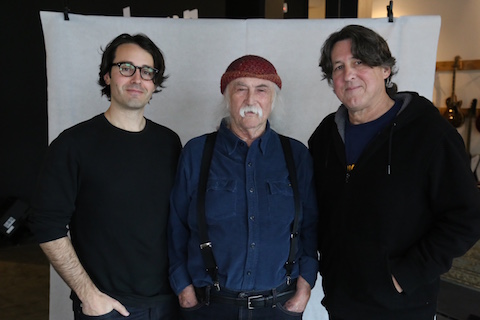
Crosby, flanked by director A.J. Eaton and producer Cameron Crowe (Photo: Henry Diltz via BMG; used with permission)
The film begins with a wild story he’s told often, of seeing jazz giant John Coltrane in a nightclub and experiencing, for the first time, the extreme effect music can have on a listener. Music, for David Crosby, has never been a job; it’s the one thing that’s gotten him over all of the bumps—to reach a stranger in an audience with his voice, his words, has always been his calling.
Watch Crosby perform a 19-minute version of “Deja Vu” in 2019
It’s still that way. Although he is a happy family man now, married to wife Jan Dance for more than three decades (“She taught me how to love myself; she taught me how to love, period,” he says), living in a stunning California home where the film’s interviews were filmed (conducted by both Crowe and Eaton), he concedes that he would choose the music over anything else. “No music?” he replies when asked if he could ever give it up. He can’t even comprehend it. He hates leaving home, Crosby says, but to sing his songs for people is why he has been put here.
Watch Crosby and Graham Nash perform “Traction in the Rain” in 1970
There is humor amidst the earnestness. During the obligatory outing to revisit locations in Los Angeles that were significant in his life and career, Crosby notes, when passing a club where the Doors performed, that he was no fan of Jim Morrison. “What a dork,” he says of the late singer. When the subject of the Rock and Roll Hall of Fame comes up, Crosby lets it be known that he feels CSN&Y should be inducted alongside CSN, “just to make [three-time inductee] Eric Clapton jealous.”
Related: Earliest Crosby solo recording discovered
There is talk of ex-lovers, from Joni Mitchell to Christine Hinton, the girlfriend who was killed in a car accident in 1969, at the age of 21. And there’s a handful of cameos from other musicians and friends, including Roger McGuinn, the former leader of the Byrds, the band with which Crosby first found fame in the mid-’60s. Speaking of Crosby’s habit of injecting political commentary into the group’s performances, McGuinn says outright that Crosby had become “insufferable,” forcing the others to boot him from the band. (The confrontation is depicted in an animated sequence.)
Watch Crosby and his band perform the Byrds’ “Eight Miles High” in May 2019
Related: 2019 Concert Review – Crosby 2.0 knocks it out of the park
The tightly edited, laser-focused Remember My Name spends some time, but not an inordinate amount of it, placing the music into historical context: the killings of four students at Kent State University in 1970 are touched upon, mainly because the horrendous incident inspired one of CSN&Y’s most powerful songs, “Ohio.” But there is plenty of recollection of the good times too: the seemingly arbitrary yet inevitable formation of CSN (we see the house where they first sang together), the rise to fame and the mega-gigs. There are tantalizing photos taken during the recording of Croz’s first solo album (photographer Henry Diltz makes an appearance), and tastes of recent concert footage, enough to convince us that Crosby’s musicality is not only intact but undergoing a major, unanticipated renaissance. (Truth be told, he sounds fantastic.)
We realize, throughout Remember My Name, that we’re seeing an old man reflecting on the highlights of a life, the rock ’n’ roll equivalent of the previous generation’s WWII reminiscences. Crosby, no way around it, looks his age. Sometimes he even acts it. But we can’t help but be riveted by him, by his unflinching eagerness to hold nothing back, to put it all out there while he still can, regardless of how that might reflect back on him. It’s quite a life this man has lived and if he is right and it’s about to end sooner than later, we now know, at least, who he thinks David Crosby was. But if he’s wrong, and he hangs around another decade or two, well, you can be sure he’ll remain a fascinating character till the very end.
Watch the official trailer for Remember My Name


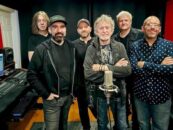
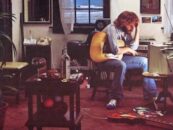

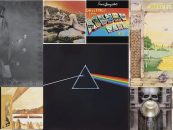

5 Comments so far
Jump into a conversationExcellent article. I undoubtedly love this web site. Keep it up!
I met the tshirt guy for Crosby s band in 2012 , he said Nash was key to David getting out and getting it right…then he was alienated. Guess someone else took over driving the ship.
Say it isn’t so, much talent even as he was getting older.
Got to see CSN in the city in 2018, they did a great job on Guinevere,
that clip does not do justice to his range. If you can, find a live clip on “Almost cut my hair” he does a fiery rendition on that song.
as I wrote elsewhere, this is terribly sad news for me, knowing it would come, and today was the day! I loved Croz from his time in the BYRDS onward…to be a teenager and have those early BYRDS albums arrive were a blessing and gift…I am heartbroken and will miss him terribly but lovingly! My condolences to his wife family and friends and fans….I will continue listen to him and all his great band and solo work as I have all my life…RIP LOVE and Gratitude DC!
If such a thing as a behind-the-scenes star exists, it would be David Crosby, for although many of his bandmates, among others, will credit his musical abilities and influence on the iconic bands he worked with, his actual contributions were mere smatterings of songs here and there among the Byrds and CS&N, and then with Y, an output not really equal to the level of fame and notoriety he achieved over the decades as a result of his association with these iconic bands. Yes, he made some solo records, the first being kind of an “underground” treasure, which stood alone in his solo efforts for many years. But the point is Crosby’s legacy, as talented as was, seemed to transcend his actual contributions to recorded history over the course of his career. That is until around 2014, when the literal final dissolution of CS&N came to a crashing thud. The finality of this seemed to light some kind of internal fuse in Crosby for a creative rocket that had been seemingly sitting in his internal storage for most of his life. Since the final breakup of CS&N in 2014, Crosby has released six albums of new music, plus a live album, all of which are critically acclaimed as being excellent. In addition, he’s been a partner in making this documentary about his life and career, in a seeming attempt to “clear the decks” as it were of all the baggage he’s collected over the course of his life and career, taking full responsibility for most of the bad vibes, lost friendships and negative press he’s received over the course of his life, with his proclamation late in life that “I’m an asshole” being issued seemingly as some kind of massive makeshift apology attempt to all previously injured parties.
Very few of us get the opportunity to finish all that was left undone, or always wished we done, set the record straight about ourselves, and attempt to right our wrongs in what we may deem as the last years of our lives, never mind having the creativity, clarity and physical wherewithal to accomplish it. But, somehow, David Crosby seemed to remarkably manage it all in his last years. His talent and his music stand on their own merit. The man himself was a complex cat who never seemingly cared what others thought about him, only about his ability to move others through his music.